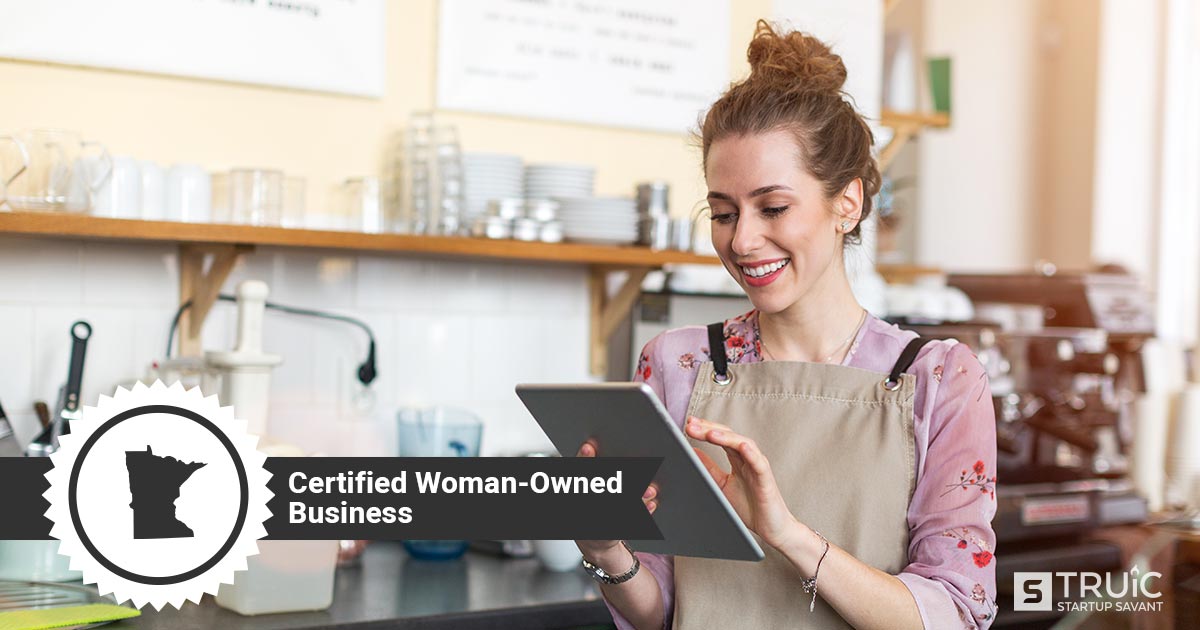The concept of being a certified woman-owned business is a relatively new one. You may have heard that the right certification can open your business up to any number of opportunities, but you may not know if you have the right business to benefit from going through the process.
The truth is that a Women-Owned Business certification in Minnesota may help more than you realize, depending on your industry, speciality, and services. We’ll look at how different groups use certifications, the businesswmen resources they provide, what it means to apply for one, and why it might be right to catapult your company to new heights.
How To Use Our Guide:
We've narrowed down the Women-Owned Business certification process. There are many resources (e.g. WBE or SBA) that will help with your application.
Follow our guide to learn more about how to become a certified Woman-Owned Business in Minnesota.
What Is a Certified Woman-Owned Business?
Certifications are essentially used to give companies an edge when applying for different opportunities. Because female entrepreneurs may have a difficult time advancing in the economy, different organizations will set aside funds especially for women-owned businesses. However, instead of verifying each one individually, decision-makers rely on certifications to ensure they’re doing business with the right people.
In order to receive this special designation, you must first apply for and be accepted by an approved organization. There’s isn’t just one type of certification though. The most prestigious certification is known as the Women-Owned Small Business (WOSB), and it’s offered through the Small Business Administration (SBA). There’s also a subset of this certification known as the Economically Disadvantaged Women-Owned Small Business (EDWOSB).
The two types of certifications offered by the SBA are generally broken down by how funds are distributed. Because the SBA is a federal agency, the WOSB and EDWOSB are usually the only two accepted for both federal contracts and contracts offered by major conglomerates.
The current goal is to award certified women-owned businesses with at least 5% of all federal contracting dollars. As a general rule, you may see more set-aside funds for EDWOSBs in traditionally male-dominated opportunities (e.g., engineering contracts, etc.).
Some companies in Minnesota will apply for the EDWOSB and the WOSB simultaneously. Doing so may give you more opportunities to qualify for different types of work. You’ll also have the added benefit of a small discount in fees through the SBA.
The WOSB and EDWOSB aren’t the only nationally accepted certifications available. There’s also a National Women’s Business Enterprise (NWBE) offered to women-owned businesses. This certification is generally not accepted for official federal bids, but can be helpful for women applying for municipal contracts, corporate opportunities, or even local partnerships.
Women-Owned Business Third-Party Certifiers
The SBA can issue a WOSB of course, but there are other ways to go about getting these certifications in Minnesota. The following have all been approved to grant these certifications, though you will still need to forward your certification(s) to the SBA so they have it on file:
- Women’s Business Enterprise National Council (WBENC): WBENC promotes diversity whenever possible and helps businesswomen become certified to go further in their careers.
- U.S. Women’s Chamber of Commerce (USWCC): This organization gives women in business the resources and work they need to grow in confidence and leadership.
- National Women Business Owners Corporation (NWBOC): This organization aims to unite millions of women-owned businesses to advocate for the advancement for all.
- El Paso Hispanic Chamber of Commerce: This resource connects, advises, and coaches women business owners. It also advocates for female entrepreneurs and provides Minority Business Enterprise (MBE) and Women’s Business Enterprise (WBE) certifications.
What Are the Qualifications to Become a Certified Woman-Owned Business?
The main qualification for becoming a WOSB in Minnesota include the following:
- All women owners of the company must be U.S. citizens
- More than half the owners of the company must be women
- Women are required to be involved in daily operations
- Women are required to make long-term strategy goals
- The business must qualify as small according to the SBA
- The top position at the company must be held by a woman
If you’re applying for the EDWOSB in Minnesota, you’ll need to meet all WOSB criteria. You’ll also need to prove the following of each individual woman business owner:
- 3-year adjusted gross income average of $350,000 or less
- Fair market value of all assets must be $6 million or less
- Net worth must be $750,000 or less
You may be able to qualify for the EDWOSB even if each woman business owner doesn’t meet all of the above criteria. While there are no exceptions for the fair market value of assets, there are exemptions for the gross income average and your total net worth.
The requirements for the NWBE are largely similar to the WOSB. Regardless of which group you’re applying through, you can expect an on-site visit for this certification where officials will observe the daily flow of operations. As with the WOSB, they’re largely concerned that women at the top of the organizations have both the skills and the authority to make strategic decisions for the company.
How Do You Become a Certified Woman-Owned Business in Minnesota?
If you’re a woman business owner in Minnesota, a women-owned business certification starts with identifying what you want out of it. Some businesses already make a product or offer a service that would be useful to both federal and local agencies alike. Other businesses will pivot their business model slightly to conform with available contracting opportunities.
Other businesses qualify for these opportunities without even realizing it. For businesses that already have a clear-cut future in federal contracts, you can consider directly applying through the SBA.
However, if you’re unsure of what’s available to you or how you fit in, then applying through a third-party organization may be the best avenue for you. Groups like the WBENC and its affiliates may be able to provide more personalized advice to give you a better idea of the best option before you waste time and money. You'll also gain access to additional businesswomen resources.
Before you get started, it may help to take a preliminary test through the SBA. Regardless of whether you want a WOSB or an NWBE, this will give you a better idea of the paperwork and proof you’ll need to ensure your success. Then, follow the preparation checklist to make sure you have everything you need for the application.
There are several ways that working with certifying organizations may be beneficial if you’re stepping outside the boundaries of the official rules. For example, some businesswomen may find that working with a third-party agency makes it easier to explain their financial situation (as opposed to going through the SBA).
The approval times for your women-owned business certification will depend on who you certify through, the volume of applications at the time you apply, and the size and complexity of your business. However, the maximum time period is usually 90 days. Some women business owners can expect approval to come within 15 days if their application is relatively simple. The exact cost for each application will also depend on who you certify through and the size of your business.
You can typically expect to spend more if you go through a third-party organization than through the SBA. Some women in business find that the benefits and support offered through a third-party justify the extra costs. Organizations like the WBENC and NWBOC were created to advocate for women. Because your success is their success, they may go the extra mile to help you get ahead.
If you’ve heard of the option to self-certify your business, you should be aware that this option is being eliminated by the SBA. After the summer of 2020, you will need to either certify through a third party or apply on the SBA’s online program. The exact regulations are expected to be finalized by June 30, 2020.
If you choose the SBA’s Women-Owned Small Business federal contracting program, you can apply for certification through their online portal. The SBA application involves two steps:
- Visit sam.gov (the System for Award Management)
- It’s free
- You will have to wait at least 72 hours before step 2
- Visit certify.sba.gov and complete the form
SBA’s online program is free to use, though you will still need to pay the required fees if you’re interested in receiving an actual certificate through a third-party, since the SBA does not provide the certificate itself. A certificate is not required for federal government contracts — you only need to be officially certified and listed on their women-owned business database.
If you’re still unsure about the specifics of the SBA’s Women-Owned Small Business Federal Contracting Program, you can call (800) 827-5722 or email answerdesk@SBA.gov. To speak to a representative, be prepared to wait approximately 5-10 minutes for the automated message to end and depending on their call volume, you may have a longer wait.
Minnesota Woman-Owned Business Certification Resources
Minnesota has two state certifications for women-owned businesses and one city certification. These certifications may be accepted by government entities, depending on funding source and type of work.
The State of Minnesota
The State of Minnesota offers several certifications for women-owned businesses, and you can apply for all of them on the same web portal. The Disadvantaged Business Enterprise (DBE), Targeted Group Business (TGB), and St. Paul Central Certification Program (CERT) can provide access to a number of state and local opportunities.
There is not a lot of information available online regarding these programs, but you can apply through the portal and work with your local officials to determine if these certifications meet your needs.
For example, the Minnesota Department of Transportation (MnDOT) offers funding opportunities for federal contracts through the state. Having a DBE certification can give you first consideration for public transit, highway, and aviation-related contracts. You can also consider applying if you offer a product or service that could be considered for concessions in the airport.
What Are the Benefits of Becoming a Certified Woman-Owned Business in Minnesota?
The vast majority of businesswomen applying for certification in Minnesota are hoping to expand their business. Securing lucrative work through the government or a national organization can give you the funding you need to hire more people, expand your skill set, and branch out to new markets. Some women will even change their business entirely to meet emerging market needs.
All certified women-owned businesses, including state-certified companies, are placed in a special directory that companies and agencies can consult when they’re looking for new partners. This marketing tool can effectively bring you business even when you’re not directly applying for it. You’ll also open yourself up to networking events, special training seminars, and educational classes aligned with your business needs.
There are few funding opportunities for female entrepreneurs in Minnesota with certified businesses. However, while a certification won’t qualify you for specific grants, you can apply for national grants available in Minnesota for women-owned businesses as well as industry-specific grants, depending on your specialty. Additionally, you can explore other small business grants for women or connect with the Small Business Development Center for additional businesswomen resources.
When it comes to women-owned businesses, Minnesota has proven to be a top contender in the nation, ranking second in one survey for women-owned businesses in the country. There are a number of national and local organizations that want to see small businesses survive, especially as more and more companies are purchased by their larger competitors. Woman-owned business certification may not be able to guarantee you the work, but it can be the key to giving you more leverage to survive in your industry.
If a woman-owned business certification is not right for you, there are additional funding opportunities for women entrepreneurs such as investors for women-owned businesses, loans, and more.



